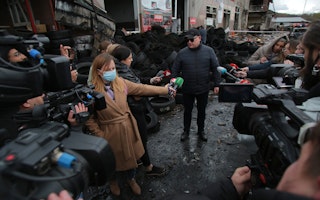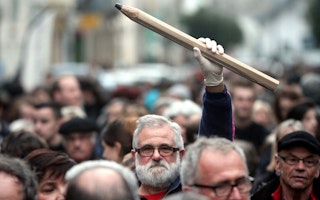UK Press Scandal Raises Risks on Free Expression
By Darian Pavli
The following article first appeared in the European Voice.
The illegal eavesdropping by News of the World, a British tabloid owned by Rupert Murdoch, with new revelations coming out on an almost daily basis, has placed media ethics under the most intense scrutiny in decades.
Tabloid investigators stand accused of having criminally hacked the voicemail messages of scores of celebrities and ordinary people, including a murdered teenager and members of the royal household. They bribed police and other security personnel to obtain salacious details sometimes from pending criminal investigations.
When journalistic ethics themselves become headline news, the media industry needs to take a hard look in the mirror.
But the scandals seem to have also prompted a race by politicians and others to promote sweeping proposals for new media regulation. While details of these plans remain scant, statements by senior officials, including Prime Minister David Cameron, give cause for worry.
The obvious danger is that the pendulum will swing too far in the other direction, making it more difficult for the media, and the general public, to hold politicians and other public figures accountable for their actions. Sometimes media enquiries must legitimately veer into these persons' otherwise private lives – as when a senior minister is found to have sped up a visa application for his lover's nanny, or made personal investments in conflict with his official position.
The extent to which public figures are entitled to privacy is a function of varying legal and cultural traditions. In the US, for example, the nation is dutifully informed of every presidential colonoscopy that would put the commander-in-chief out of commission for a few hours. In France, on the other hand, former president François Mitterrand treated his cancer ailment as a “state secret” for more than ten years, before coming clean in 1992.
But some basic European standards have emerged in recent years, even though in the less-than-ideal context of celebrity legal fights against tabloid coverage.
In 2004, the Strasbourg-based European Court of Human Rights (ECHR) caused a stir when it overruled Germany's top court in finding that Princess Caroline of Hanover was entitled to go shopping with her children without being trailed by paparazzi. The ruling was surprising, in part, because Germany was thought to have struck a careful balance between privacy rights and the demands of a free press. Following the Caroline case, German courts have had to give up the concept that an “absolute person of contemporary history” is entitled to little privacy outside the home, in favour of a more calibrated, case-by-case balancing. But they continue to take seriously the need for the press to remain a vigorous watchdog on matters of genuine public interest.
So does the ECHR itself. Thus, it has ruled that French courts should have allowed the circulation of a tell-all book by Mitterrand's doctor nine months after the former president's death, despite the clear breach of doctor-patient confidentiality. And in May 2011, the ECHR dismissed a claim by Max Mosley, the former president of the Formula One association and the subject of tabloid attention, that British law should be reformed to give potential privacy victims a right of prior notification by the media before stories on them are even published. That would go, in the words of the Court, beyond “the limited scope ...for restrictions on the freedom of the press to publish material which contributes to debate on matters of general public interest”.
Britain needs no new laws on privacy; it should simply enforce the laws already in the books. And despite the temptation – and perhaps some schadenfreude among a British political class badly shaken by the recent scandal over the expenses of members of parliament – it should resist the urge for tighter media regulation.
Instead, the Cameron government should speed up the libel law reforms under consideration, which would undo London's reputation as libel capital of the world. And it is always worth recalling that it was the dogged investigation of another newspaper (The Guardian), rather than any efforts by the UK police, that ultimately brought down the News of the World.
Until April 2015, Darian Pavli was senior attorney on freedom of information and expression issues with the Open Society Justice Initiative.


